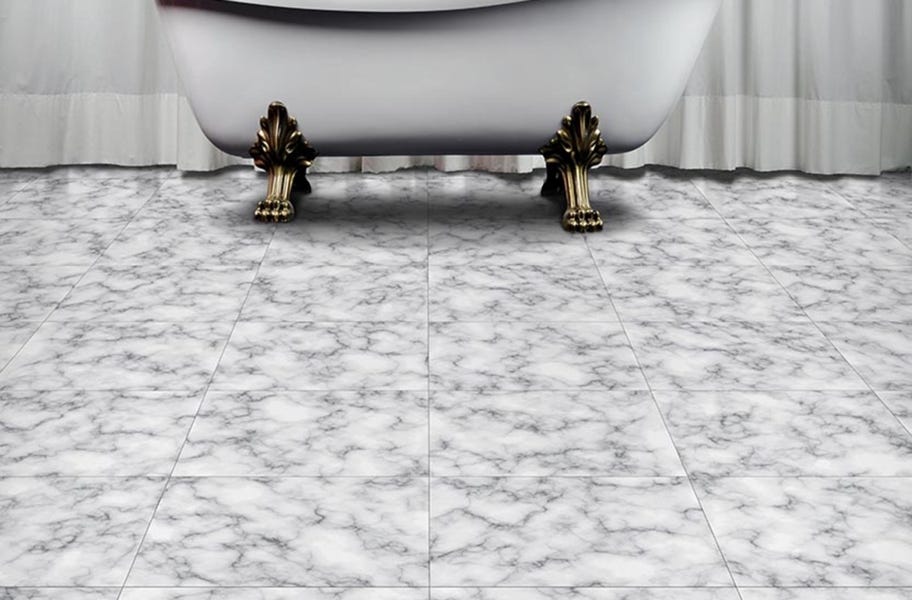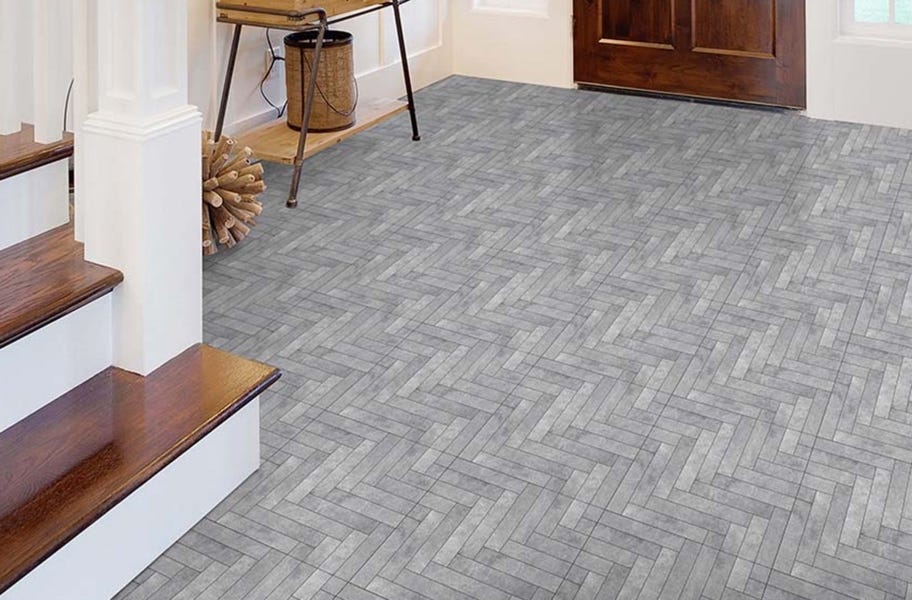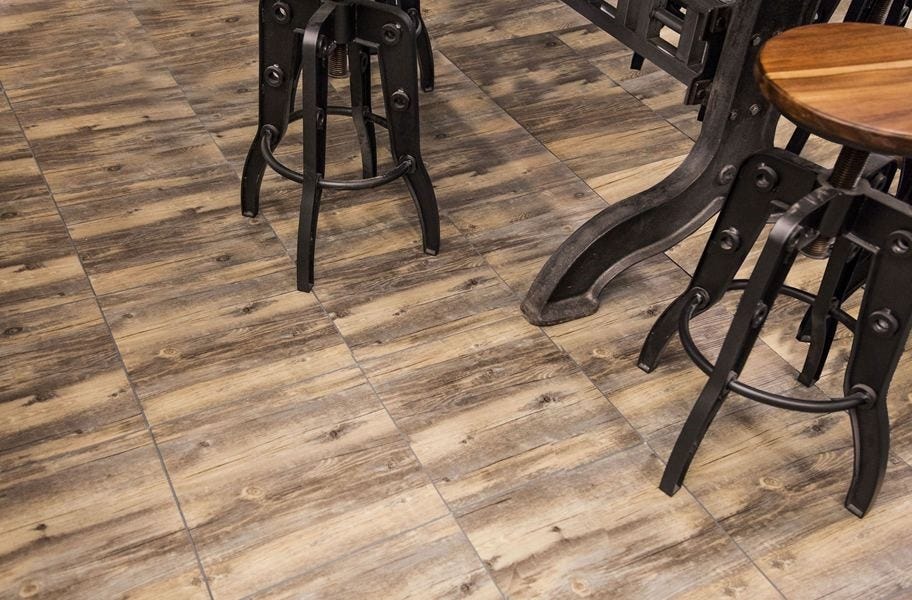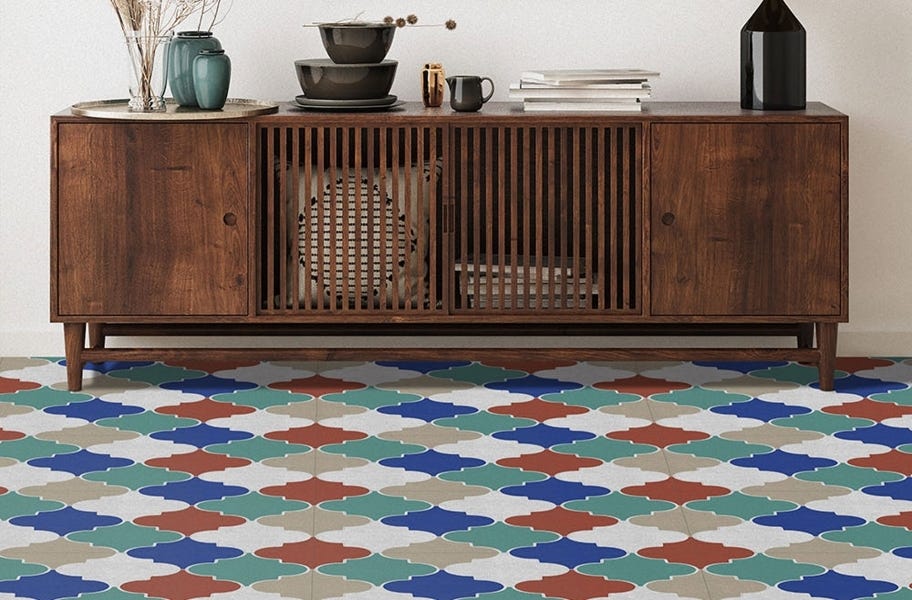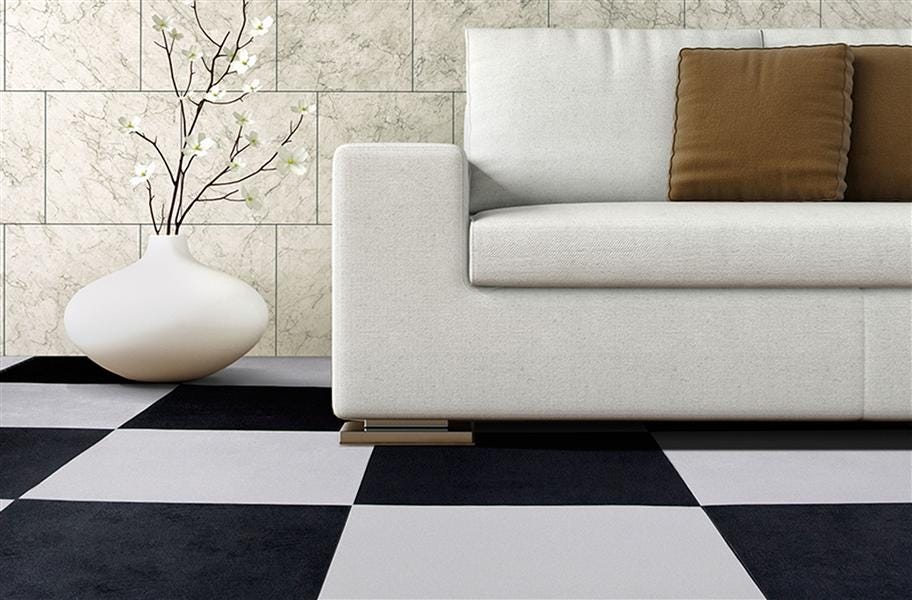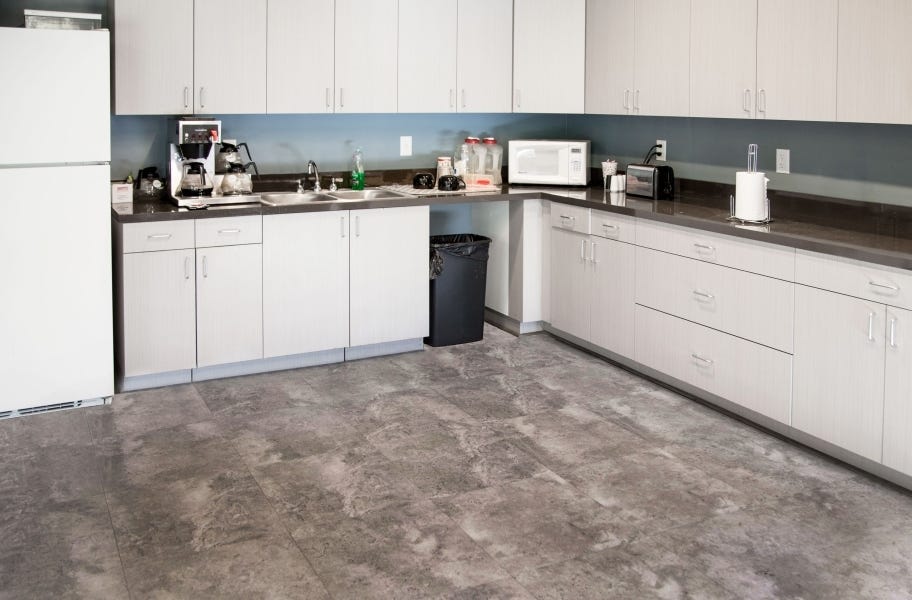
Searching for vinyl tile flooring? With so much information out there, it can be difficult to settle on the perfect vinyl tile.
Good news: this guide has everything you need to know about vinyl tile flooring. Get ready to learn about the different types of vinyl tiles, how to install them, the trendiest styles, and more!
| Related Content >> Vinyl Flooring Buying Guide |
What is Vinyl Tile Flooring?
Vinyl tile flooring has many types. There’s luxury vinyl, flexible vinyl tile, and everything in between. Let’s go over the types of vinyl tile you’ll find out there, and their best uses.
Types of Vinyl Tile Flooring
With vinyl tile, there are plenty of opportunities to expand where and what kind of tile you want to lay down.
Luxury Vinyl Tile (LVT)
LVT stands for luxury vinyl tiles. These tiles typically have a rigid construction and they’re made to be very durable. They’re higher quality than peel and stick tiles. They can stand up to the abuse of higher traffic, kids, and pets.
It’s worth noting, the term “luxury” is kind of like “organic.” There isn’t an industry standard or definition so you have to be a little wary when you see it. Usually, a luxury vinyl product includes a thick, durable floor, multiple layers, a realistic printed layer, a tough wear layer, and sometimes, a textured surface.
Waterproof Vinyl Tile
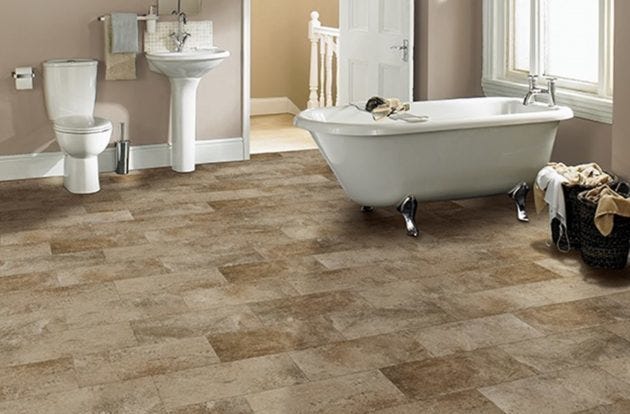
Waterproof vinyl tile flooring is luxury vinyl that is 100% waterproof. It’s great for bathrooms, kitchens, basements, and anywhere you can think of.
Waterproof vinyl tile typically features a four-layer construction that includes a waterproof core. This core is what sets this luxury vinyl apart from the rest. You have two options for the core: wood-plastic composite (WPC) and stone-plastic composite (SPC or rigid core).
Flexible Vinyl Tile
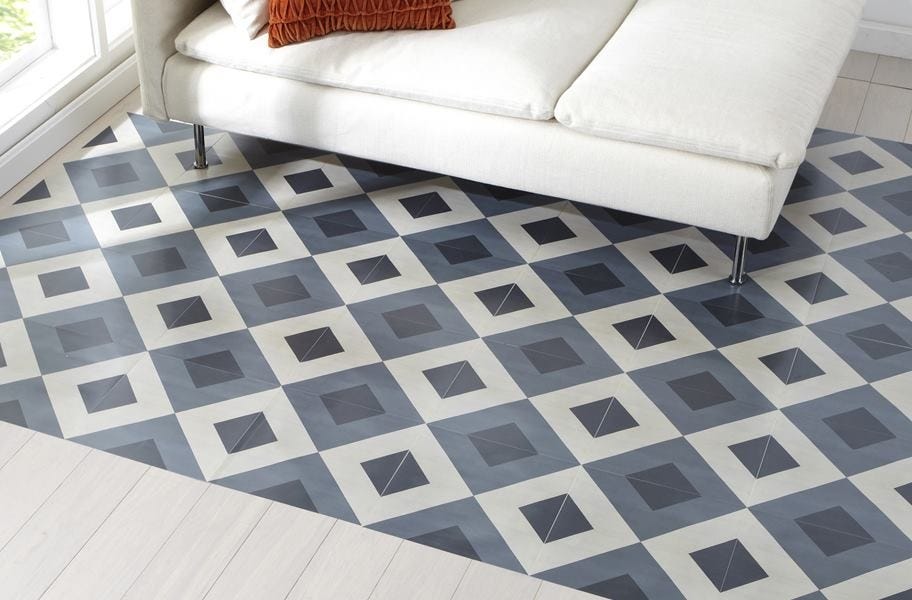
This type of vinyl tile is usually considered designer tile. That means it’s for decorative use and often features different patterns and colors.
Flexible vinyl tile is usually peel and stick or interlocking. It does not have a rigid construction like PVC vinyl. Instead, it flexes, making it easy to cut and install as needed. Flexible vinyl tile can even have anti-fatigue properties depending on the construction.
| Related Content >> SPC vs. WPC Vinyl Flooring: Learn the Difference |
Styles of Vinyl Tiles
Whether you’re on the hunt for something trendy or classic, you’ll find it with vinyl tile flooring.
Stone-Look Vinyl
Stone looks are more common with vinyl tile since natural stone and marble typically come in tile form. This look is especially popular in bathrooms and kitchens.
You can choose from the trendiest stone and tile looks, like concrete, travertine, and slate. This option gives your home a look of luxury and elegance
Wood-Look Vinyl
If you want tile that looks like wood, you have some options, though this look is more common with vinyl planks.
With vinyl tile, you can find wood-look flooring with all the latest trends, including gray tones, detailed textures, and light wood colors.
Decorative Vinyl
Maybe natural looks aren’t the style for you. If that’s the case, you’ll want decorative vinyl tiles.
Decorative styles are something you can’t get as much in laminate or tile flooring. This is where you can have bright colors, creative patterns, and even vintage looks like black and white checkered tile.
Decorative vinyl tiles truly have it all. From kits that can transform the playroom into a space adventure to the most stylish geometric looks, you can have it all with vinyl tile.
| Related Content >> Vinyl Flooring Trends |
Installing Vinyl Tile Flooring
Vinyl flooring tiles have a lot of DIY-friendly installation options. You can peel and stick them, interlock them, and even grout them for a more realistic tile look.
Check out more details for each option to decide what is best for you!
Interlocking
Depending on the tile, interlocking installation is either tongue and groove or clicking together tiles. The vinyl tiles simply lock together to create a floating floor. The floor does not adhere to the subfloor, but the weight of the floor holds it in place.
It’s super DIY-friendly and requires only a few extra tools like a rubber mallet and a utility knife.
Peel and Stick
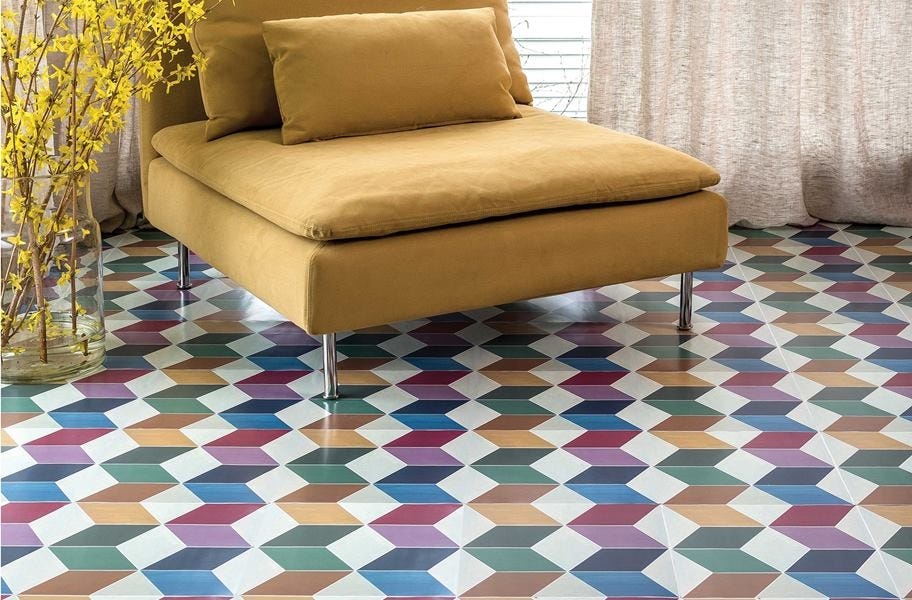
This installation method is incredibly easy. You just peel away the backing and stick the tile to a clean, even surface.
This installation is good for low-traffic areas since typically peel and stick vinyl isn’t as durable as other types of luxury vinyl flooring.
Loose Lay
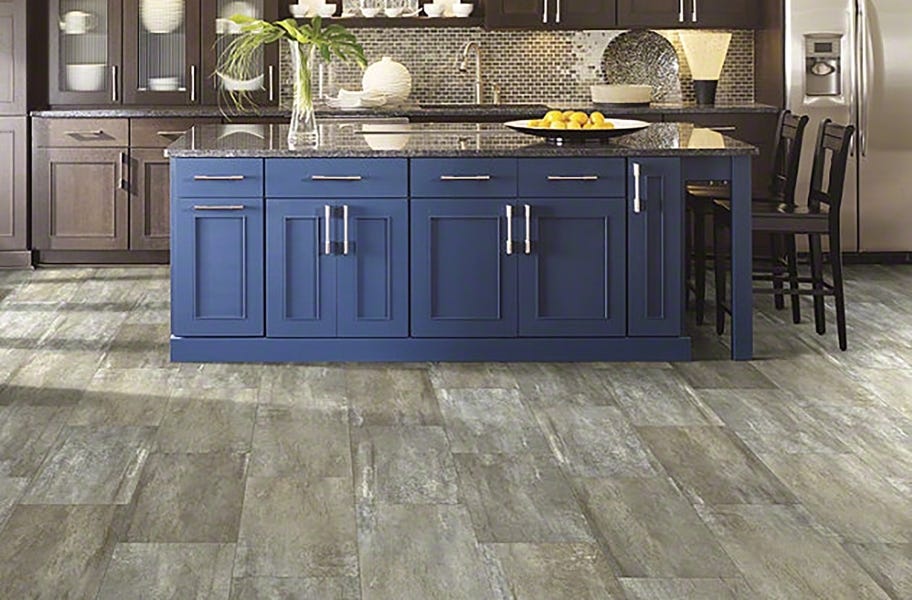
With loose lay tiles, each tile has a backing that grips the subfloor and keeps it from moving. This means that you can simply just lay down the tiles and not use any glue to keep them in place. You can do this if the room will not be getting much traffic.
However, if your space is going to have a decent amount of traffic, it’s recommended you use double-sided carpet tape around the perimeter and undeath tiles to keep any tiles from shifting. If you want something more permanent, glue down the tiles.
Glue Down
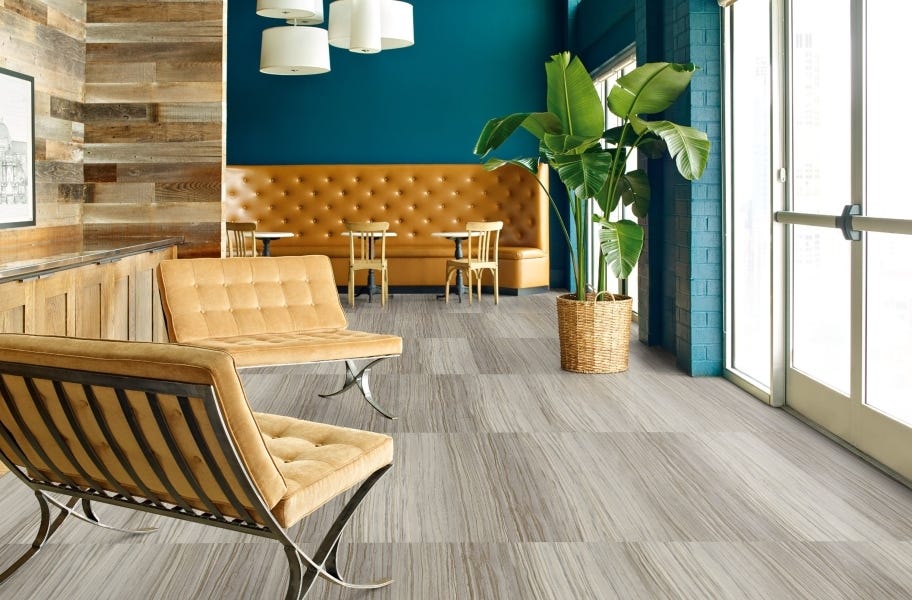
Permanent and high-traffic areas usually need flooring with a super-secure hold. That’s when the glue-down method comes in.
This installation method is a bit more involved, as it requires a pressure-sensitive adhesive. You glue tiles down as you go. This ensures that each vinyl tile is fully bonded to the floor below it.
Groutable
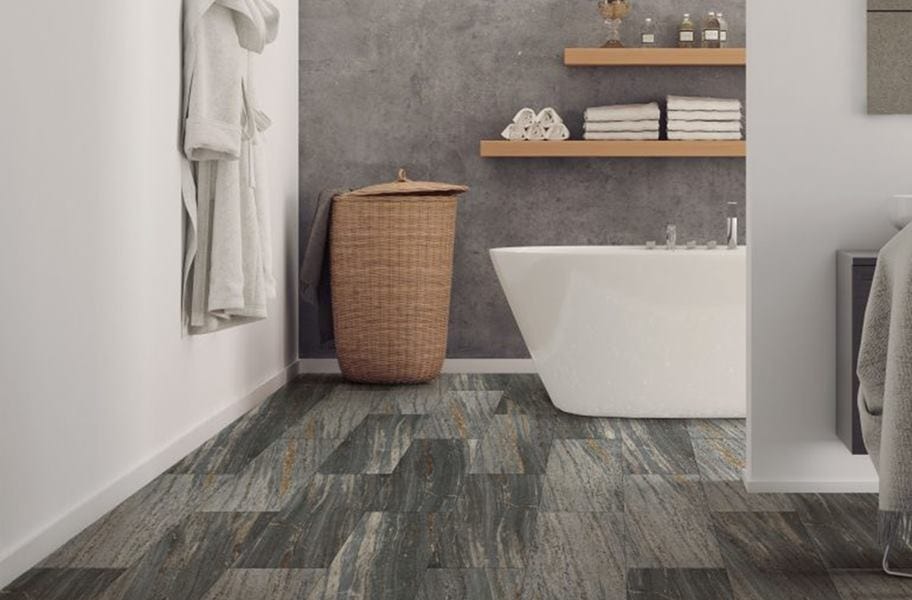
If you want a stone look without the stone, groutable tiles are the way to go. These look like real stone and with the added capabilities of adding grout, the realism increases even more.
You can install these tiles using the glue-down method or using double-sided carpet tape. The next step is adding the grout.
| Related Content >> Waterproof Vinyl Flooring Buying Guide |
How to Clean Vinyl Tile Flooring
Luxury vinyl tiles and planks are easy to keep clean and maintain. Be sure to vacuum up any dust, dirt, or debris. It’s best to use a vacuum without a beater bar for this.
You can also use a damp mop to keep your vinyl flooring clean. Be sure to clean up any spills immediately to prevent damage to your flooring.
Beyond simple cleaning, here are some tips to keep your floor looking good.
- Always use plywood or other boards when moving heavy objects across the floor to avoid scratching the floor surface.
- Use felt pads under chair and furniture legs to prevent scratching of the floor surface.
- Place walk-off door mats at all entrances and doorways to collect debris from shoes such as dirt, rocks, and moisture, from being tracked in and onto your new floors.
- Avoid using rubber-backed area rugs or floor mats as they can stain the flooring surface over time.
- Use non-staining floor protectors underneath heavy furniture, chairs, and tables.
- Daily or weekly vacuuming or dust mopping to remove dirt, grit, dust, etc. Do not use treated dust mops.
- When mopping, use a damp mop instead of a damp mop.
- Clean up spills immediately to prevent damage to the floor.
Vinyl Tile FAQ
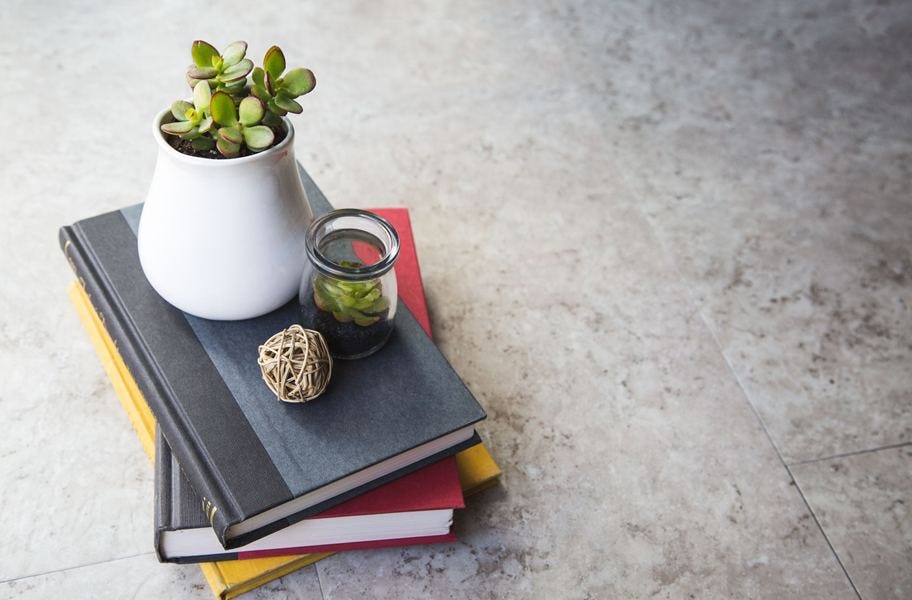
Still have questions about vinyl tile flooring? Don’t worry! We have the answers you need.
What is the difference between LVT and LVP flooring?
LVT stands for luxury vinyl tile, while LVP stands for luxury vinyl planks. The main difference between LVT and LVP flooring is the shape. Square and rectangular luxury vinyl tiles are popular for stone-look floors. Meanwhile, luxury vinyl planks are longer and are designed to mimic natural wood planks.
Is LVT flooring waterproof?
WPC and SPC luxury vinyl tiles are 100% waterproof, meaning you can install them at any level and in any room of your home. Other kinds of LVT are water-resistant, so these floors can repel water for a while before absorbing moisture. However, if you want to get the perfect floor for your bathroom or kitchen, I recommend you purchase WPC or SPC core waterproof vinyl tiles.
How do I install luxury vinyl tiles?
Luxury vinyl tiles, also known as LVT, are typically easy to install. Designed with an interlocking tongue-and-groove system, these vinyl tiles click lock together and “float” over your existing subfloor. Other installation options include loose lay, glue down, or groutable tiles. Depending on how permanent you want your flooring to be, and how you want it to look, you can choose the installation method that’s right for you.
Do I need underlayment for luxury vinyl tile flooring?
Some vinyl tiles come with an attached underlayment, so you can save time and money on installation. Underlayments absorb sound, soften the floor underfoot, and can even reduce temperature transfer when it’s cold. Not all luxury vinyl tiles come with an attached underlayment, and you need to purchase one if they don’t.
Conclusion
By now, you probably have a good idea about what type of vinyl floor tiles you’ll want for your space. You have lots of options to choose from, and who doesn’t love options? You can get started on your flooring journey with free samples from us.



